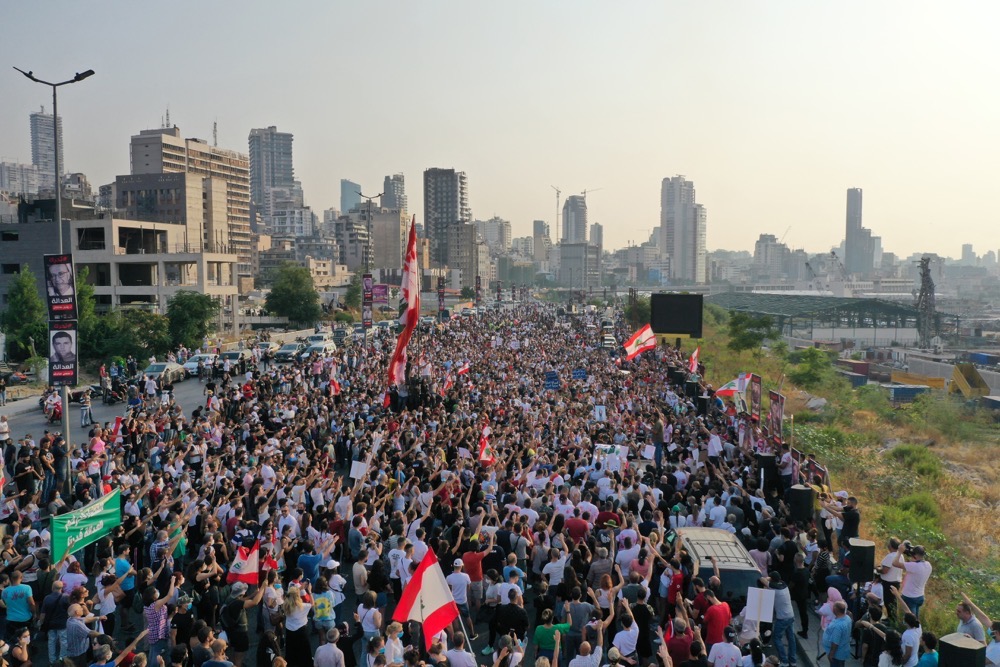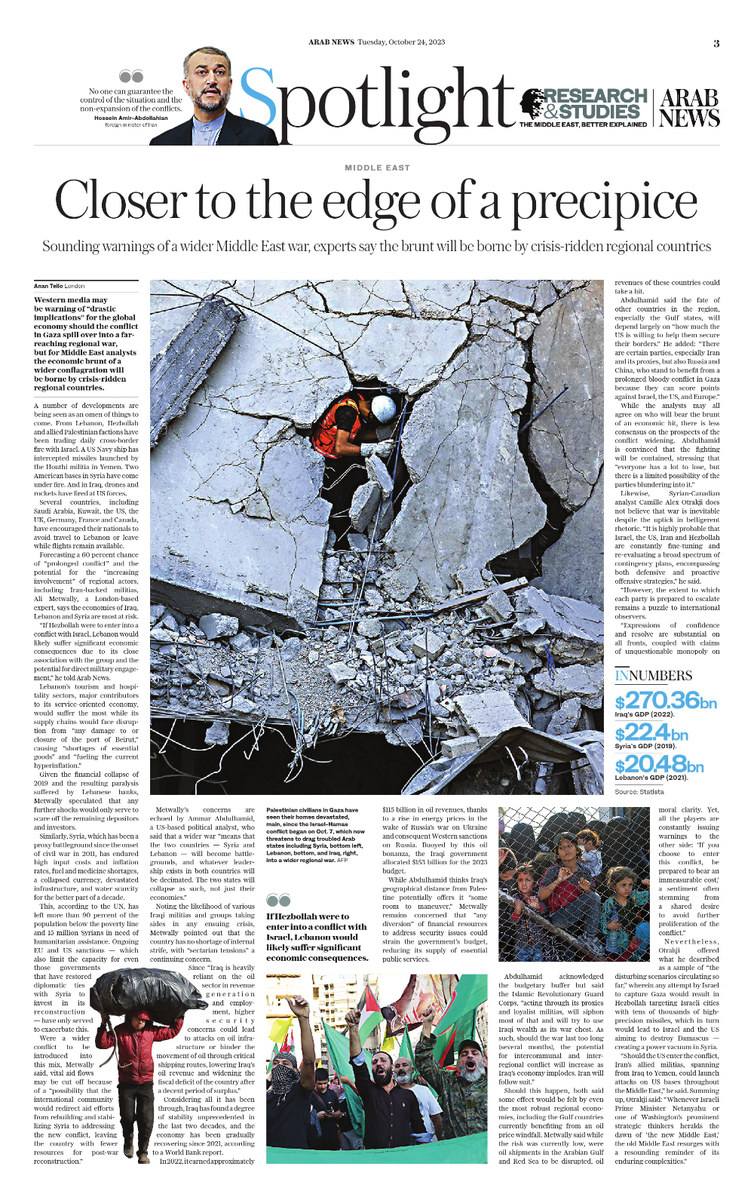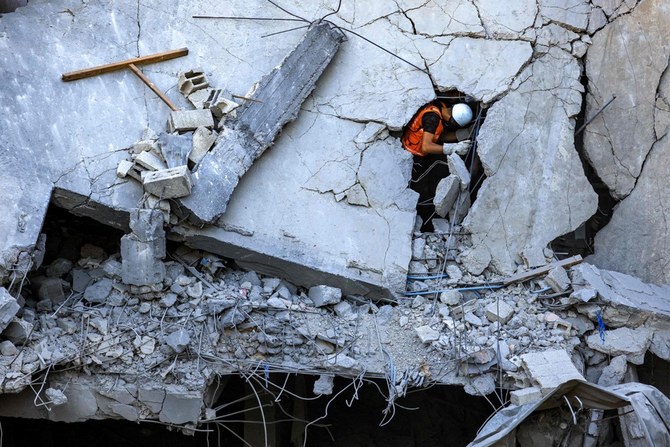LONDON: Western media may be warning of “drastic implications” for the global economy should the conflict in Gaza spill over into neighboring countries, but Middle East analysts predict that the economic brunt of a wider conflagration will be borne by crisis-ridden regional countries.
A number of developments are being seen as an omen of things to come. From Lebanon, Hezbollah and allied Palestinian factions have been trading daily cross-border fire with Israel. A US Navy ship has intercepted missiles launched by the Houthi militia in Yemen. Two American bases in Syria have come under fire. And in Iraq, drones and rockets have fired at US forces.
Several countries, including Saudi Arabia, Kuwait, the US, the UK, Germany, France and Canada, have encouraged their nationals to avoid travel to Lebanon or leave while flights remain available.
Forecasting a 60-percent chance of “prolonged conflict” and the potential for the “increasing involvement” of regional actors, including Iran-backed militias, Ali Metwally, a London-based expert, says the economies of Iraq, Lebanon and Syria are most at risk.
“If Hezbollah were to enter into a conflict with Israel, Lebanon would likely suffer significant economic consequences due to its close association with the group and the potential for direct military engagement,” he told Arab News.

Palestinian girl carries a blankets as she walks past the site of a deadly explosion at al-Ahli hospital, in Gaza City. (AFP)
Lebanon’s tourism and hospitality sectors, major contributors to its service-oriented economy, would suffer the most while its supply chains would face disruption from “any damage to or closure of the port of Beirut,” causing “shortages of essential goods” and “fueling the current hyperinflation.”
Given the financial collapse of 2019 and the resulting paralysis suffered by Lebanese banks, Metwally speculated that any further shocks would only serve to scare off the remaining depositors and investors.
Similarly, Syria, which has been a proxy battleground since the onset of civil war in 2011, has endured high input costs and inflation rates, fuel and medicine shortages, a collapsed currency, devastated infrastructure, and water scarcity for the better part of a decade.
This, according to the UN, has left more than 90 percent of the population below the poverty line and 15 million Syrians in need of humanitarian assistance. Ongoing EU and US sanctions — which also limit the capacity for even those governments that have restored diplomatic ties with Syria to invest in its reconstruction — have only served to exacerbate this.
Were a wider conflict to be introduced into this mix, Metwally said, vital aid flows may be cut off because of a “possibility that the international community would redirect aid efforts from rebuilding and stabilizing Syria to addressing the new conflict, leaving the country with fewer resources for post-war reconstruction.”
Metwally’s concerns are echoed by Ammar Abdulhamid, a US-based political analyst, who said that a wider war “means that the two countries — Syria and Lebanon — will become battlegrounds, and whatever leadership exists in both countries will be decimated. The two states will collapse as such, not just their economies.”

From Lebanon, Hezbollah and allied Palestinian factions have been trading daily cross-border fire with Israel. (AFP)
Noting the likelihood of various Iraqi militias and groups taking sides in any ensuing crisis, Metwally pointed out that the country has no shortage of internal strife, with “sectarian tensions” a continuing concern.
Since “Iraq is heavily reliant on the oil sector in revenue generation and employment, higher security concerns could lead to attacks on oil infrastructure or hinder the movement of oil through critical shipping routes, lowering Iraq’s oil revenue and widening the fiscal deficit of the country after a decent period of surplus.”
Considering all it has been through, Iraq has found a degree of stability unprecedented in the last two decades, and the economy has been gradually recovering since 2021, according to a World Bank report.
INNUMBERS
• $270.36bn Iraq’s GDP (2022).
• $22.4bn Syria’s GDP (2019).
• $20.48bn Lebanon’s GDP (2021).
Source: Statista
In 2022, it earned approximately $115 billion in oil revenues, thanks to a rise in energy prices in the wake of Russia’s war on Ukraine and consequent Western sanctions on Russia. Buoyed by this oil bonanza, the Iraqi government allocated $153 billion for the 2023 budget.
While Abdulhamid thinks Iraq’s geographical distance from Palestine potentially offers it “some room to maneuver,” Metwally remains concerned that “any diversion” of financial resources to address security issues could strain the government’s budget, reducing its supply of essential public services.
Abdulhamid acknowledged the budgetary buffer but said the Islamic Revolutionary Guard Corps, “acting through its proxies and loyalist militias, will siphon most of that and will try to use Iraqi wealth as its war chest. As such, should the war last too long (several months), the potential for intercommunal and inter-regional conflict will increase as Iraq’s economy implodes. Iran will follow suit.”

The economies of Iraq, Lebanon and Syria are most at risk, experts say. (AFP)
Should this happen, both said some effect would be felt by even the most robust regional economies, including the Gulf countries currently benefiting from an oil price windfall. Metwally said while the risk was currently low, were oil shipments in the Arabian Gulf and Red Sea to be disrupted, oil revenues of these countries could take a hit.
Abdulhamid said the fate of other countries in the region, especially the Gulf states, will depend largely on “how much the US is willing to help them secure their borders.” He added: “There are certain parties, especially Iran and its proxies, but also Russia and China, who stand to benefit from a prolonged bloody conflict in Gaza because they can score points against Israel, the US, and Europe.”
While the analysts may all agree on who will bear the brunt of an economic hit, there is less consensus on the prospects of the conflict widening. Abdulhamid is convinced that the fighting will be contained, stressing that “everyone has a lot to lose, but there is a limited possibility of the parties blundering into it.”
Likewise, Syrian-Canadian analyst Camille Alex Otrakji does not believe that war is inevitable despite the uptick in belligerent rhetoric. “It is highly probable that Israel, the US, Iran and Hezbollah are constantly fine-tuning and re-evaluating a broad spectrum of contingency plans, encompassing both defensive and proactive offensive strategies,” he said.
“However, the extent to which each party is prepared to escalate remains a puzzle to international observers.

According to the UN, more than 90 percent of the population lives below the poverty line and 15 million Syrians are in need of humanitarian assistance. (AFP)
“Expressions of confidence and resolve are substantial on all fronts, coupled with claims of unquestionable monopoly on moral clarity. Yet, all the players are constantly issuing warnings to the other side: ‘If you choose to enter this conflict, be prepared to bear an immeasurable cost,’ a sentiment often stemming from a shared desire to avoid further proliferation of the conflict.”
Nevertheless, Otrakji offered what he described as a sample of “the disturbing scenarios circulating so far,” wherein any attempt by Israel to capture Gaza would result in Hezbollah targeting Israeli cities with tens of thousands of high-precision missiles, which in turn would lead to Israel and the US aiming to destroy Damascus — creating a power vacuum in Syria.
“Should the US enter the conflict, Iran’s allied militias, spanning from Iraq to Yemen, could launch attacks on US bases throughout the Middle East,” he said. Summing up, Otrakji said: “Whenever Israeli Prime Minister Netanyahu or one of Washington’s prominent strategic thinkers heralds the dawn of ‘the new Middle East,’ the old Middle East resurges with a resounding reminder of its enduring complexities.”

































